When Real Madrid confirmed the signing of Trent Alexander-Arnold, social media erupted with excitement.
Reports from the Spanish capital suggested that Los Blancos believed they had pulled off a major coup — securing the best right-back in the world for just £8.5 million, according to the BBC. The move to the Santiago Bernabéu was seen as a bargain for a player of Trent’s quality, experience, and pedigree.
Trent Alexander-Arnold is, without question, the best right-back in the world right now. Renowned for his exceptional passing range, pinpoint crosses, and creative vision, he has been an assist machine for Liverpool over the years. His technical ability, intelligence on the ball, and leadership off it make his departure a massive blow for Liverpool Football Club.

Assist Machine
History has already been made. No defender in the history of English football has contributed more assists for their team than Trent Alexander-Arnold.
At just 21 years old, during the 2018/19 Premier League season, the Liverpool right-back delivered 12 assists — the most ever by a defender in a single campaign. This remarkable achievement earned him a place in the Guinness World Records 2020 edition. Even more impressively, he went on to break his own record the following season by registering 13 assists, further cementing his status as the most creative full-back in Premier League history.
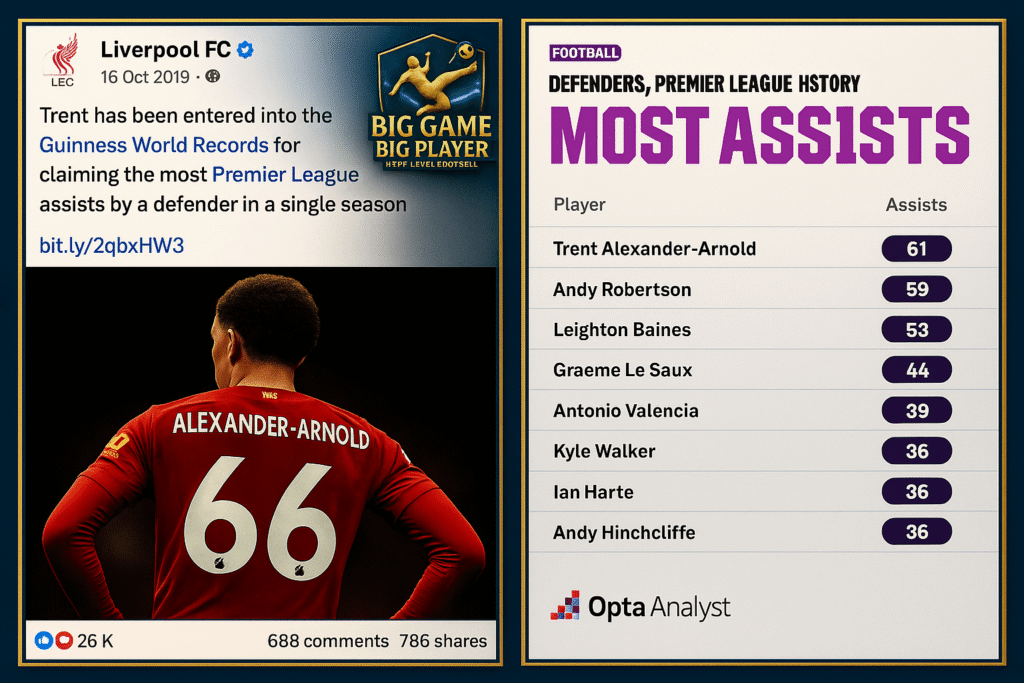
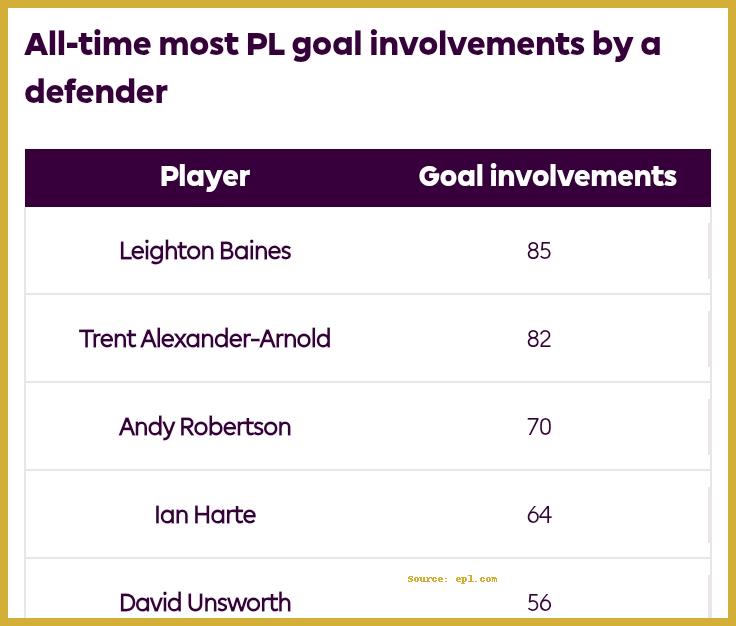
Pass Master
Over recent seasons, Trent Alexander-Arnold has consistently demonstrated elite passing ability. His vision, precision, and timing allow him to deliver perfectly weighted balls into dangerous areas of the opposition half and inside the 18-yard box. As a right-back, his capacity to dictate attacking plays from deep positions has been unmatched in modern football.
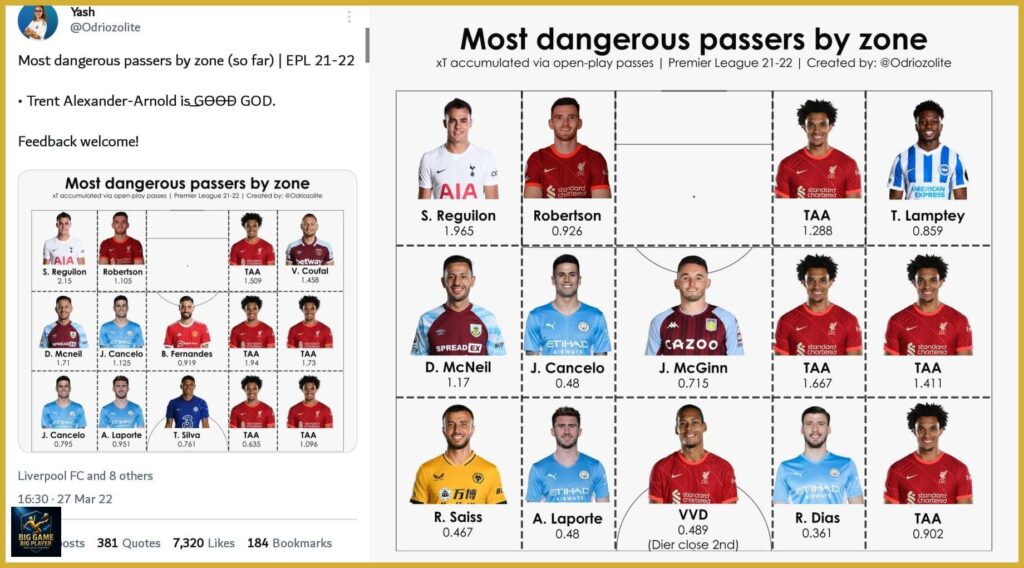
As illustrated, Trent Alexander-Arnold has the ability to deliver pinpoint passes from virtually any position along the right flank. This versatility has been crucial to Liverpool’s tactical setup, allowing the team to advance the ball efficiently and relieve defensive pressure. His distribution from deep and wide areas has consistently been a key factor in Liverpool’s attacking build-up.

Trent Alexander-Arnold’s exceptional passing ability is best illustrated by standout moments like the two examples below. In one of his final appearances for Liverpool, Trent delivered a stunning, defence-splitting pass that instantly transformed a defensive phase into a clear goal-scoring opportunity — a perfect example of his game-changing vision and technique.
It’s remarkable that Trent Alexander-Arnold still manages to excite and impress Jürgen Klopp, even after years of playing under the German manager’s watchful eye. Despite Klopp’s long tenure on Liverpool’s front-row bench, witnessing Trent’s brilliance week in and week out, the right-back continues to dazzle with his creativity, composure, and match-defining moments.
Fitness, Speed & Ball Control
The Premier League has no shortage of pacey players and technically gifted talents. However, what sets Trent Alexander-Arnold apart is his rare ability to control the ball and maintain balance at top speed — something many fast players struggle with due to poor first touch, a flaw that’s notoriously difficult to fix.
Trent’s speed, elite fitness levels, and tactical awareness allow him to cover large areas of the pitch, press high, and dominate the right-hand side for both club and country. His balance, ball control, and composure under pressure are hallmarks of a truly world-class right-back.
Fitness remains a key differentiator at the elite level. As one insightful fan on X (formerly Twitter) put it, referencing Reece James’ recurring injury woes: “Ability without availability doesn’t help much.” Reece James, while undoubtedly talented, must overcome his fitness issues to play consistently and help Chelsea compete in both the Premier League and Champions League. To his credit, he has shown resilience, recently helping the Blues lift the Europa Conference League trophy.
Trent’s Defensive Frailty Is Massively Overrated
Thomas Tuchel, who currently manages the England national team and now oversees Trent Alexander-Arnold at international level, is the latest high-profile figure to question the right-back’s defensive capabilities.
However, raw defensive data suggests that Tuchel’s concerns may be slightly misplaced. Despite the criticism, statistics reveal that Trent has made significant contributions on both ends of the pitch.
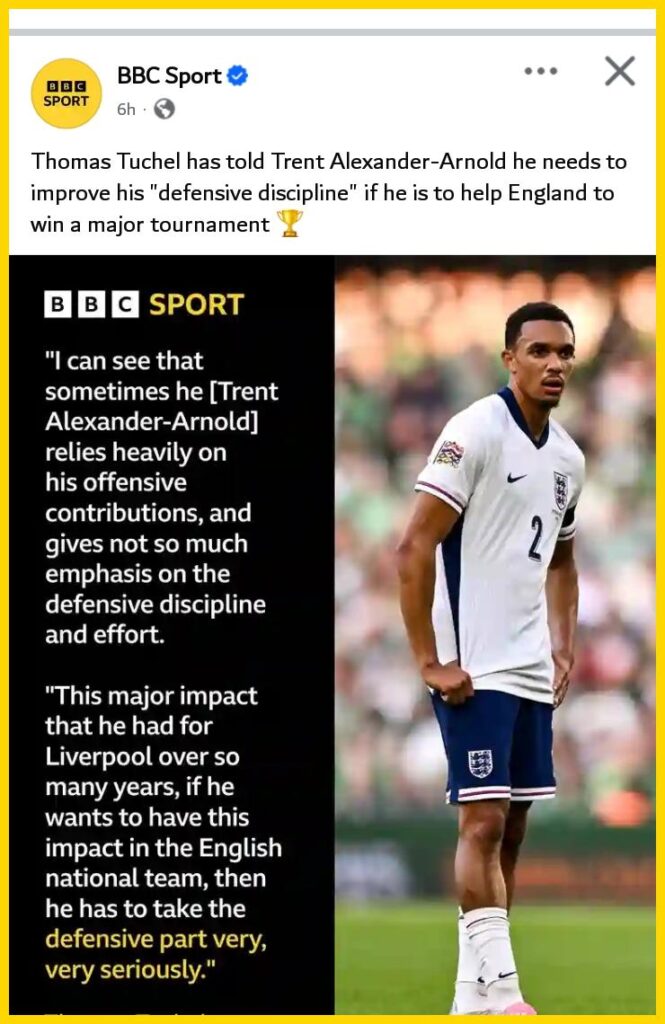
What EPL Data Shows
In the entire history of the English Premier League, only four defenders have recorded more combined tackles and interceptions than Trent Alexander-Arnold. Even more impressively, just one defender has recovered possession more times than the Liverpool right-back. These stats highlight Trent’s often-underappreciated defensive impact and challenge the narrative that he is a liability at the back.
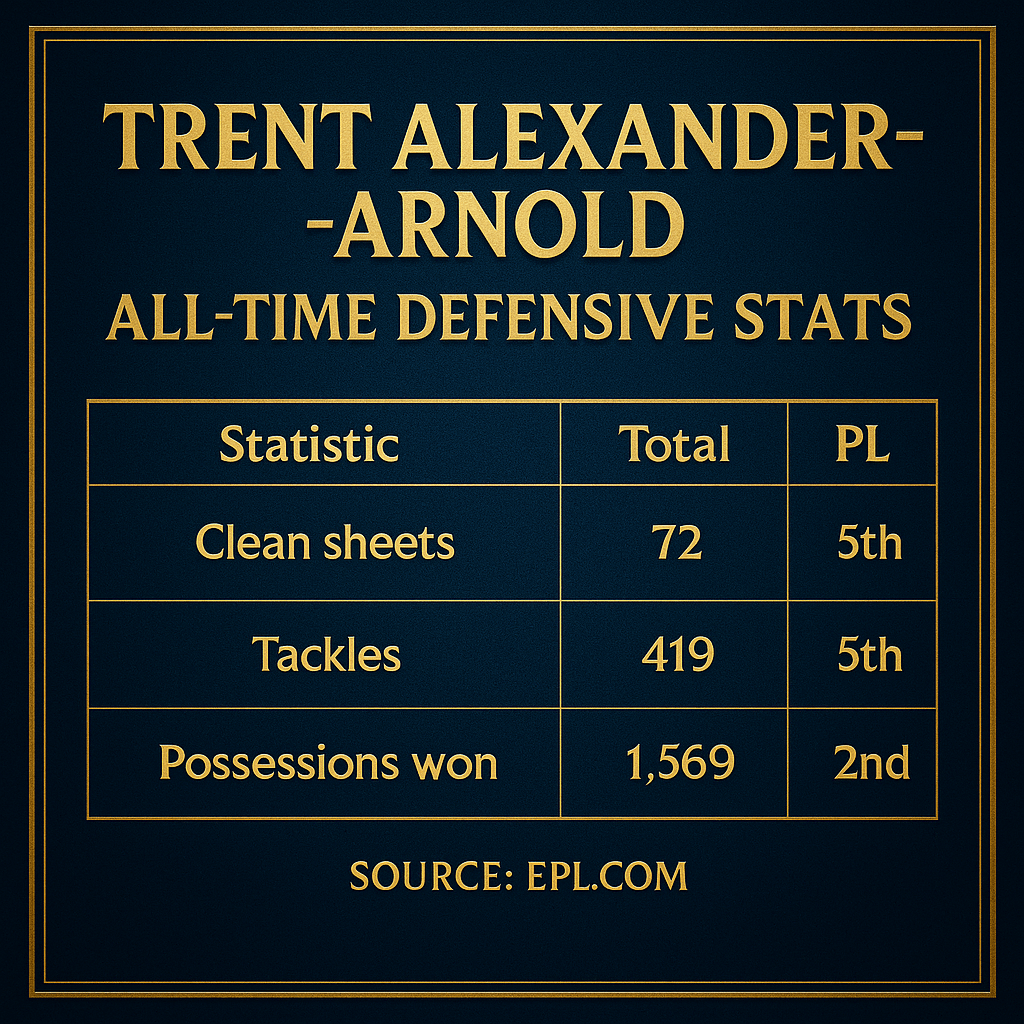
Trent Alexander-Arnold ranks 6th among all defenders for the most interceptions in English Premier League history — a testament to his defensive awareness and reading of the game.
Additionally, during his time at Liverpool, he ranks 11th among defenders for the fewest goals conceded while on the pitch, further proving that his defensive contributions are both real and impactful.
Trent’s Football Philosophy: Why Attacking Is The Most Effective Defensive Strategy In Football


In a hypothetical battle between two fighters—one armed with two swords and the other with one—it’s easy to predict who would dominate over 90 minutes. Naturally, the fighter with two swords would inflict more damage and stay in control.
The same concept applies in football: the goal is to keep the opposition so preoccupied with defending that they have little time or space to mount meaningful attacks. Trent Alexander-Arnold embodies this philosophy, constantly pushing forward and forcing opponents to focus on survival rather than strategy.
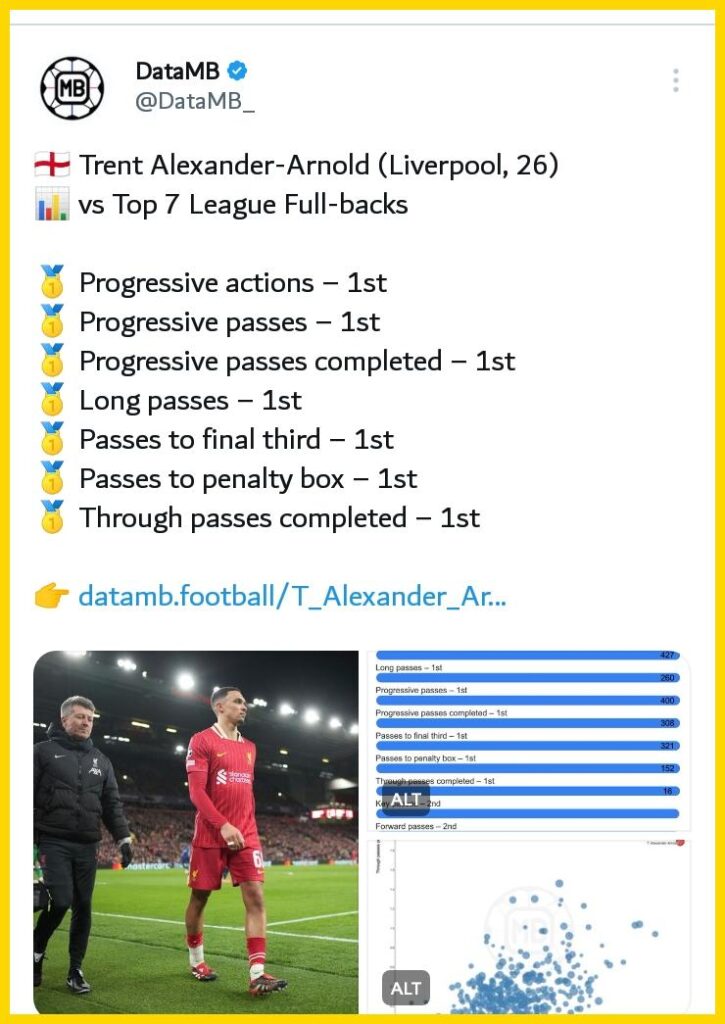
According to Liverpool’s official website, Trent Alexander-Arnold has openly stated that he enjoys “going forward and helping the team create as many chances as possible.” That attacking mindset perfectly sums up his playing style.
For Trent, every minute spent on the front foot is a minute stolen from the opponent’s ability to attack — a proactive approach that defines modern full-back play.
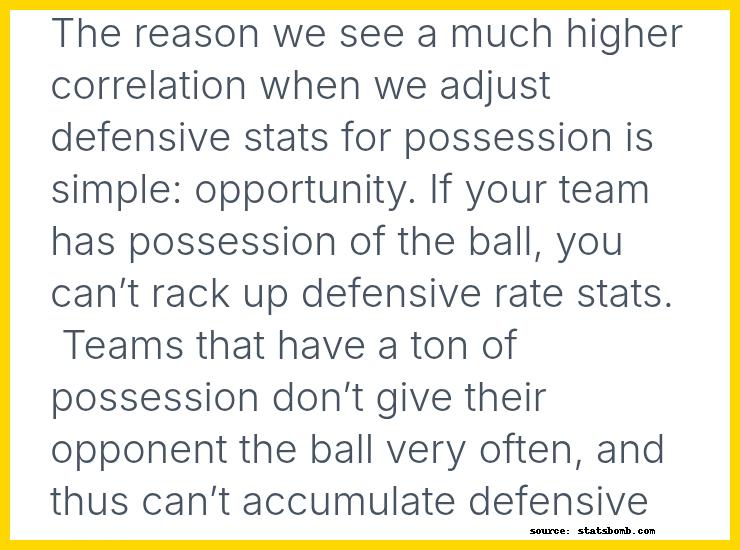
Also, what did Paolo Maldini think about tackles?
Evaluating a player solely based on interceptions and tackles can be misleading — especially in teams that dominate possession. In such systems, players naturally record fewer defensive actions simply because their side spends more time on the ball. This reflects a proactive footballing style, where control and pressing reduce the need for reactive defending.
Conversely, teams that adopt a low block or “park-the-bus” approach — where most players sit deep behind the ball — tend to invite pressure. As a result, defenders in such systems are forced to make more tackles, blocks, and clearances. This is characteristic of a reactive football philosophy.
So the real question is: which tactical approach brings out the best in Trent Alexander-Arnold? The answer likely lies in the proactive style — one that suits his strengths in ball progression, creativity, and offensive involvement.
Jürgen Klopp’s “Heavy-Metal” Football Style
Commonly known as “gegenpressing,” heavy-metal football is a high-intensity tactical approach that involves relentless pressure and wave after wave of attacks. Teams that adopt this style aim to bombard their opponents with quick passes, dangerous crosses, and sustained offensive presence in the final third.
To execute this system effectively, players must master rapid transitions — moving the ball from their own half into the opponent’s 18-yard box within 15 seconds or less. This requires not only blistering speed and elite fitness levels but also exceptional passing and crossing accuracy. The ultimate objective is to win possession high up the pitch and keep the opposition under constant pressure.
In such a system, players like Trent Alexander-Arnold thrive. His combination of pace, stamina, and pinpoint delivery makes him an ideal fit for a gegenpressing setup.


Pep Guardiola’s “Perfect” Footballing Style
Pep Guardiola’s football philosophy revolves around total ball possession. Theoretically—and even mathematically—it makes perfect sense: if your team keeps 100% possession, you can’t lose the game. This possession-based approach underpins much of Guardiola’s tactical brilliance, built on control, patience, and dominance.
To execute this style of football, players must excel in short and long-range passing, possess outstanding ball control, and have the speed and fitness required to press aggressively and recover possession the moment it’s lost. It’s a demanding system that values intelligence, precision, and relentless work ethic.

Arsène Wenger’s “Football Should Be An Art” Quote
Just like art, football is a form of expression — and that expression is best seen when a player has the ball. What a player does in possession defines their identity more than what they do without it. It’s difficult to call someone a “winner” solely because they spend most of the game defending.
Jürgen Klopp once remarked about Arsène Wenger’s football philosophy, noting that “Wenger’s teams like to pass the ball and retain possession more.” That observation rings true. Wenger’s commitment to attacking football and possession-based play is legendary.
The former Arsenal manager famously said he would prefer to win 4-3 rather than 1-0 — prioritizing beautiful, expressive football over defensive pragmatism. And honestly, that’s a philosophy many fans and players still admire and agree with today.
Which Philosophy Is The Best?
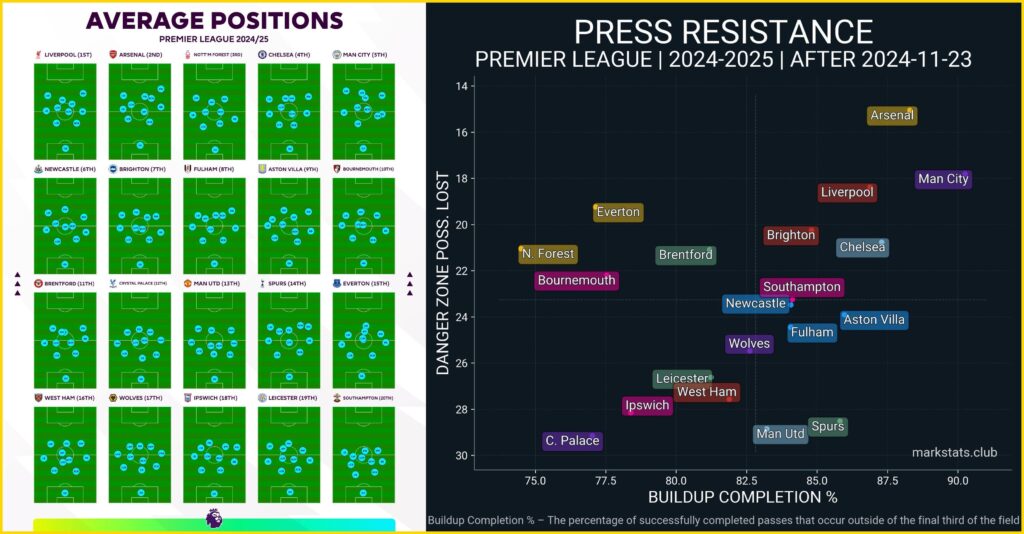
Dated April, 2025: Average Playing Position For Different Teams Vs their Press-Resistance
According to data from Opta and the official Premier League website (epl.com), Manchester City, Liverpool, and Arsenal were the three teams that consistently operated in the most advanced positions on the pitch throughout the season.
These high defensive lines and advanced average positions reflected their dominance in possession and control of matches. Unsurprisingly, all three clubs were also among the best-performing teams in the Premier League last season — not only in terms of points but also in having some of the league’s strongest defensive records.
What’s Next for Trent Alexander-Arnold?
Time will tell, but all signs suggest that Trent Alexander-Arnold is an ideal fit for Xabi Alonso’s tactical approach in both La Liga and the UEFA Champions League.
Real Madrid fans are eager to see how Trent’s deep-lying creativity will complement attacking stars like Kylian Mbappé and Vinícius Júnior. His ability to dictate play from deeper positions could be the key to unlocking defenses and sustaining Real Madrid’s attacking dominance.
It’s hard to believe that a club of Real Madrid’s stature would make such a move without fully understanding both Trent Alexander-Arnold’s strengths and weaknesses — and how he can be perfectly integrated into a system built to win major trophies.
Conclusion
Every player has weaknesses — you just have to look closely to spot them. But at the elite level, the real question isn’t whether flaws exist; it’s how effectively a coach can maximize a player’s strengths to help the team succeed.
Trent Alexander-Arnold is a prime example. Both Jürgen Klopp and Arne Slot have built systems that elevate Trent’s best attributes — his vision, passing, and attacking threat.
Now, as he begins a new chapter at Real Madrid, it will be up to Xabi Alonso and Thomas Tuchel to do the same if they hope to fully unlock the potential of one of the best right-backs in world football.


Leave a Reply